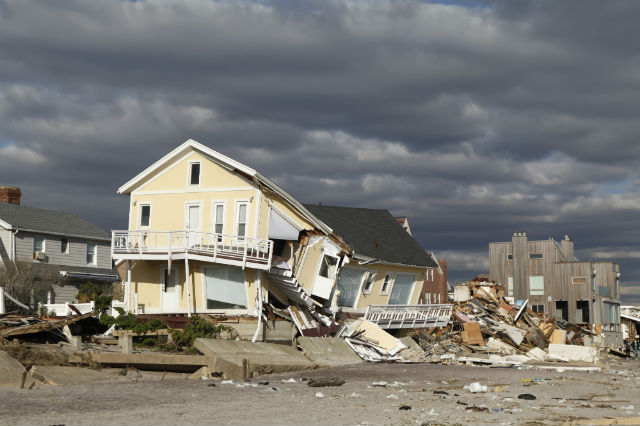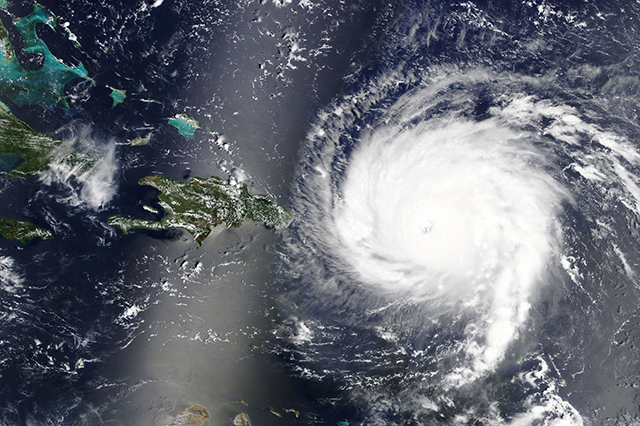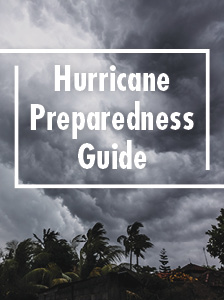The 2024 Atlantic hurricane season, which begins June 1 and extends through Nov. 30, is likely to be a busy one.
Colorado State University’s Tropical Weather and Climate Research predicts an “extremely active” year, anticipating 23 named storms, five of which could become major hurricanes.
Despite even the most accurate forecasts, it’s hard to pinpoint the property damage total that can result from a hurricane or severe storm. From Katrina to Sandy to Ian, storms continue to make historic benchmarks in losses. Weather and climate disasters in the U.S. from 1980 to 2022 cost approximately $2.6 trillion in damages, according to the National Oceanic and Atmospheric Administration.
Without the right insurance coverage, it can be hard to recover after a hurricane hits. Here are some of the most important things to know about hurricane insurance deductibles.
To speak to a AAA insurance agent about your storm coverage, schedule a call today.
The History of Hurricane Insurance Deductibles
In 1992, Hurricane Andrew left insurers with $15.5 billion in losses – at the time, the costliest hurricane in U.S. history. From that point, hurricane insurance was determined to be a necessity in coastal areas to help cover high-cost property losses due to storm risks like hail and high winds.
“After the wake-up call of Andrew, insurers in many coastal states began to sell homeowners insurance policies with percentage deductibles for storm damage,” according to the Insurance Information Institute. “These deductibles are stated as a percentage of the insured value of the homes and generally are a higher dollar amount than traditional dollar deductibles used for other types of losses such as fire damage and theft.”
Nineteen states and the District of Columbia have hurricane deductibles. In the Northeast, this includes Connecticut, Massachusetts, New Jersey, New York and Rhode Island.
It should be noted that hurricane deductibles do not include flooding. Flood insurance must be purchased separately.
What Is a Hurricane Insurance Deductible?
A deducible is the amount of loss paid by the policyholder before insurance kicks in. Percentage deductibles are calculated as a specified percentage of the insured value of your property.
The exact percentage of your hurricane insurance deductible will be noted on your homeowner policy.
In the event a hurricane damages your home, you’ll be responsible for around 1-5% of the insured value before your coverage starts. As explained by the Insurance Information Institute, “If a house is insured for $300,000 and has a 5% deductible, the first $15,000 of a claim must be paid out of the policyholder’s pocket.”
Based on where you live, some insurance companies may offer hurricane deductibles stated as higher dollar amounts or possibly no separate hurricane deductible at all. In both cases, this will be reflected in the premium that’s being charged. You can ask your agent about what options are available to you.

When Does Hurricane Insurance Coverage Kick In?
There are a few things necessary for hurricane insurance to apply. These triggers vary by state and insurance carrier, but a good indicator comes from the National Weather Service. Once a hurricane watch or warning is issued, the intensity level is crucial. The moment a Category 1 hurricane makes landfall is when the deductible becomes applicable.
How Well Do You Understand Your Hurricane Insurance Deductible?
Of the homeowners surveyed in New Jersey, North Carolina, South Carolina, Texas and Florida 34% had never heard of hurricane deductibles, according to a 2017 report by the Insurance Research Council. It was found that over 25% lacked understanding of basic deductibles and 33% were unsure of the percentage applied.
New Jersey respondents demonstrated the lowest level of awareness and understanding of several hurricane deductible issues, despite the fact that about 346,000 homes in New Jersey were damaged or destroyed by Sandy.
This lack of understanding makes it harder to gain coverage in the aftermath of a hurricane-related event.
Know Your Insurance
When shopping for insurance, always check the financial rating of a company, especially if you live in an area that is prone to hurricanes. Catastrophic weather events result in large swaths of damage that may generate large losses for a particular company and can exceed their ability to pay all the claims.
Each state has its own rules regarding hurricane insurance. Talk to your insurance agent to run through all of the technicalities of your policy to make sure you can get the right coverage.
Speak to a AAA insurance agent today.
Did we help you to better understand hurricane deductibles? Leave a comment below.
3 Thoughts on “The Ins and Outs of Hurricane Insurance Deductibles”
Leave A Comment
Comments are subject to moderation and may or may not be published at the editor’s discretion. Only comments that are relevant to the article and add value to the Your AAA community will be considered. Comments may be edited for clarity and length.
















“always check the financial rating of a company ” – several of the links to rating services did not work.
Like to know about home insurance.
Hi Jermiya, a AAA Insurance agent will be happy to help you. Please click here for a list of ways to contact them.